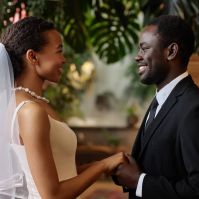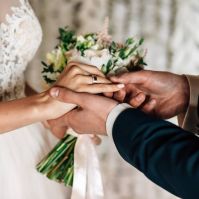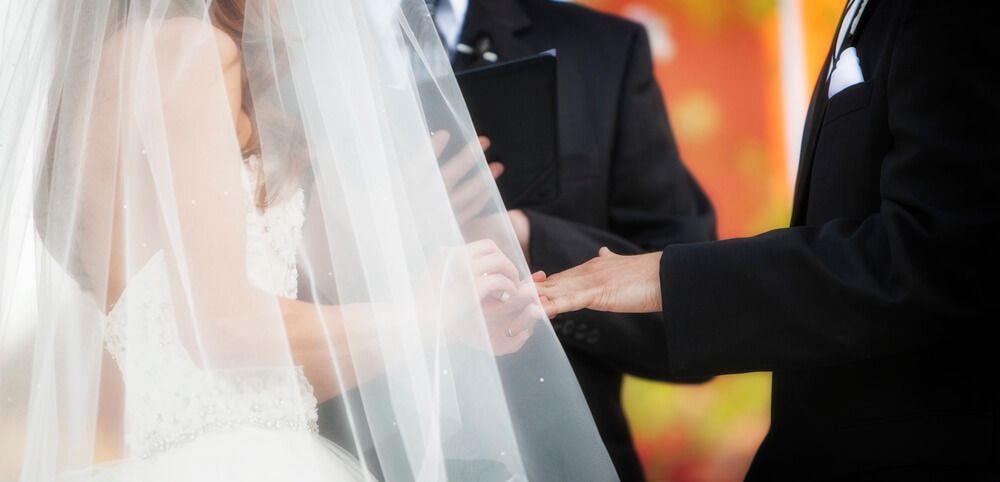
Being asked to officiate a wedding is a great honor. As the person who unites two people in matrimony, you play an integral role in one of the most important moments of their lives. Many officiants understand the weight of this responsibility and spend so much time worrying about creating the perfect wedding script that they forget to consider what an officiant should wear to a wedding.
Wearing the right officiant attire not only helps you feel comfortable and confident but ensures that you fit seamlessly into the ceremony’s atmosphere. If you’ve been chosen to solemnize a wedding, follow this guide to make sure you look your best while staying true to the couple’s style and preferences.
4 Steps to Help You Decide What to Wear When You Officiate a Wedding
Deciding what to wear as a wedding officiant can feel like a daunting task, especially with so many variables to consider. Here’s how you can narrow down your options and make sure your attire is both fitting and respectful.
1. Talk to the Couple
As an officiant, the most important step in determining what to wear is to talk to the couple. They are the ones who have a vision for their day and will likely have some expectations when it comes to your clothing.
Ask them if there’s a specific dress code or style they would like you to follow. Always align with their vision, no matter your own preferences, as you will be a prominent figure in their photos.
2. Understand the Dress Code
When speaking with the couple, take the time to understand the overall aesthetic they have in mind for their wedding and how they’re choosing to set the dress code. The guidelines they set will heavily dictate what you wear.
For example, a formal, black-tie event requires a different outfit than a laid-back beach ceremony. Knowing whether the wedding is modern, rustic, bohemian, or traditional will help you select something that complements the vibe — and more importantly, does not clash with it.
3. Consider the Season
The season and venue are also factors to consider when choosing your officiant attire. An outdoor wedding in the summer might call for lightweight fabrics and breathable materials, while winter nuptials may require something more substantial to keep you warm.
4. Dress for the Venue
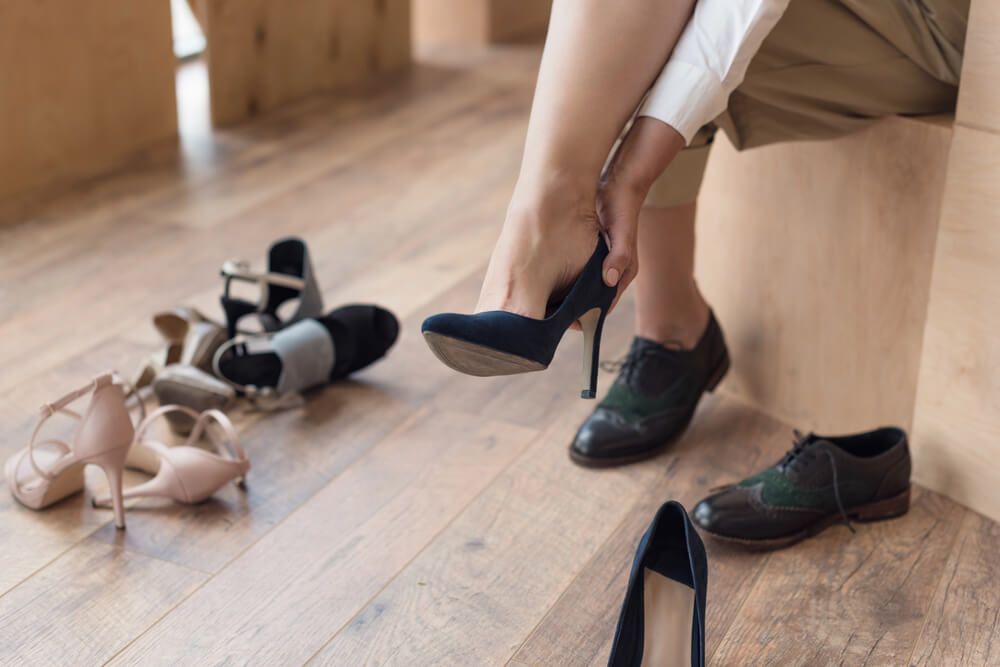
Consider the ceremony location as well. If the wedding is taking place on a sandy beach, stilettos will not be practical. Instead, opt for a more comfortable shoe choice, such as sandals or flat dress shoes. If the wedding is held indoors in a formal venue, such as a church or ballroom, you may want to lean toward more traditional attire.
What Do Non-Religious Wedding Officiants Wear?
Non-religious wedding officiants often have more flexibility in choosing their attire compared to those who belong to a religious organization. The key to selecting what to wear as a wedding officiant is understanding that a non-religious ceremony tends to focus more on the couple’s love story and personal beliefs.
For many non-denominational officiants, a professional, elegant look works best. If the event is more on the formal side, male officiants might opt for a tailored suit, while female officiants may go with a floor-length dress. For semi-formal or casual events, it’s generally okay to go a little more relaxed. In those cases, nice pants and blazer or a jumpsuit may be perfectly suitable.
When choosing your outfit, keep in mind that while you’re not the focus of the event, you’re still an important (and highly visible) figure in the ceremony. Your attire should reflect that significance. You don’t want to overshadow the couple, but you do want to look polished and well-put-together.
Generally, secular officiants steer clear of overly casual clothing, such as T-shirts or jeans, instead opting for refined yet approachable styles that convey confidence without drawing too much attention.
Wedding Officiant Outfit Ideas for Different Wedding Themes
What you wear to officiate a wedding largely depends on the type of ceremony you’re presiding over. Here are some outfit suggestions for different wedding themes that you can draw inspiration from.
Formal Weddings
For formal, black-tie weddings, the officiant should go for a classic, polished look. For men, a well-tailored tuxedo or a dark suit with a crisp white shirt and a coordinating tie or bowtie is ideal.
Women might choose a sophisticated gown or an elegant dress that fits the tone of the event. Avoid anything too flashy or casual, as the goal is to maintain a refined, professional appearance that complements the grandeur of the ceremony.
Beach Weddings
Beach weddings tend to be more relaxed, so your attire should reflect that. For men, a light-colored linen suit with a breathable shirt is both comfortable and chic.
Women can opt for a flowy maxi dress in a lightweight fabric, such as chiffon, or a breezy sundress in soft, pastel tones. Shoes should be practical – think sandals or flat shoes – since you’ll likely be standing in the sand.
Rustic or Outdoor Weddings
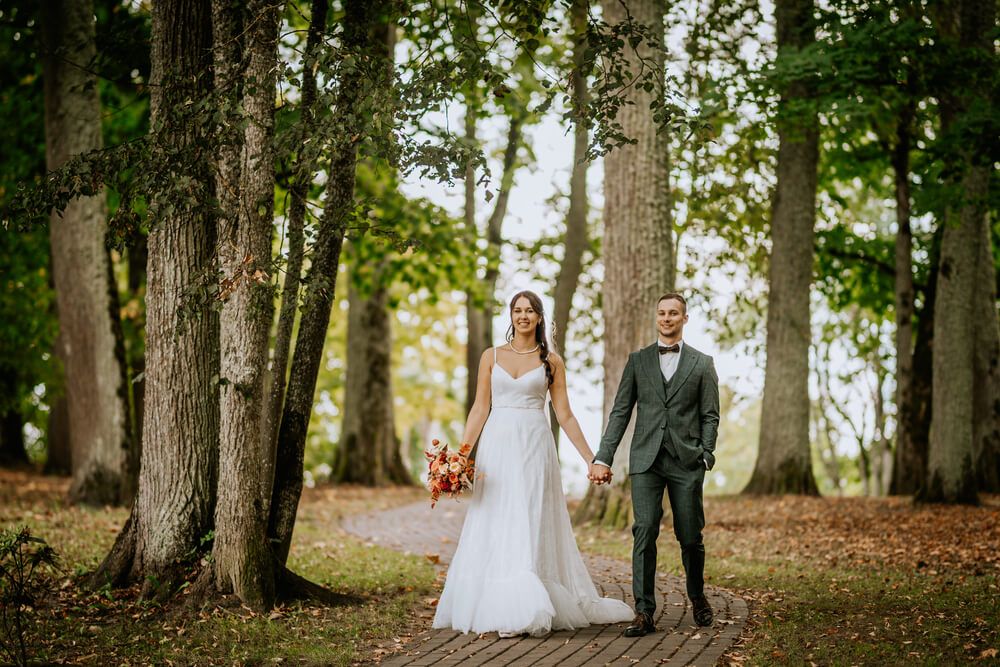
For rustic or outdoor weddings, consider a blend of casual and polished styles. Men can wear a linen or seersucker suit paired with a dress shirt and tie, while women can opt for a simple floral dress or a flowy midi dress, complemented by comfortable wedges or sandals.
You can also experiment with accessories like a wide-brimmed hat or a statement belt. It’s all about embracing the relaxed, nature-inspired setting while maintaining an elevated sense of style.
Elopements
Elopements are often more intimate and casual affairs, which means the attire for officiants can be simpler but still stylish. A tailored suit or a chic jumpsuit works well for men and women alike. The key is to look sophisticated while also feeling comfortable in a more relaxed atmosphere.
How Do I Obtain Clergy Apparel for Officiating?
The Universal Life Church makes it simple for ministers to find professional attire for ceremonies. Through the ULC Minister Store, ordained ministers can order a range of clergy apparel such as shirts, robes, cassocks, and clerical dickeys. These garments are designed to create a polished, formal appearance that aligns with the role of an officiant.
By browsing the “Clothing & Accessories” section of the Minister Store, ministers can choose attire that matches the tone and formality of the wedding they are conducting.
Where Can I Buy Officiant Stoles and Accessories?
If you would like to add a stole or other ceremonial accessories to your outfit, the ULC Minister Store also carries a variety of options. The store features the Ceremonial Minister Stole in several liturgical colors, as well as multicolor and specialty designs like the Alpha Omega Stole.
In addition, you’ll find complementary items such as clerical collars, dickeys, and cassocks that can help complete your officiant look. These accessories allow you to personalize your appearance while still maintaining the dignity and professionalism expected of a wedding officiant.
What If I’m in the Wedding Party and I’m Also Officiating?
In an era where over 50% of couples are asking a friend or family member to officiate their wedding, it’s common for the officiant to also be a bridesmaid or a groomsman. If that’s the case, you should consult with the couple on whether you’ll need a separate outfit for wedding party photos and for the ceremony itself.
When in Doubt, Officiants Should Wear Classic Attire
When you’re uncertain about what to wear as a wedding officiant and the couple hasn’t given you a clear idea of what they want, keeping it classic is always a safe bet. A timeless, professional look will ensure that you appear polished and respectful, without overshadowing the couple or their guests.
How Do You Become an Officiant?
It’s one thing to know what to wear to officiate a wedding, but what about getting certified to actually perform the ceremony? For that, you’ll need to sign up to become a wedding officiant.
Fortunately, that step is easy. The Universal Life Church provides a straightforward and accessible way for anyone, regardless of their background or religious beliefs, to become ordained online.
The process is simple, free, and takes just minutes. Once ordained, you’ll have the power to officiate legal wedding ceremonies (and look good doing it).

